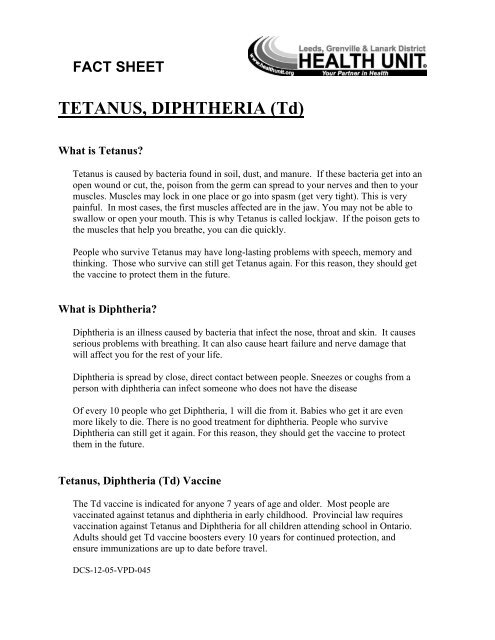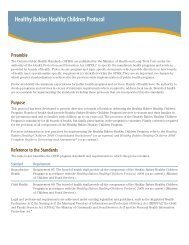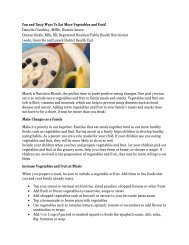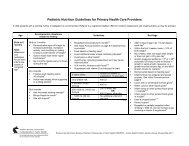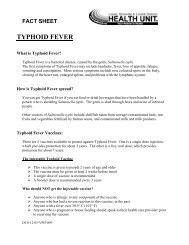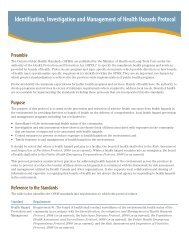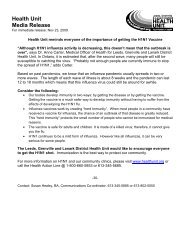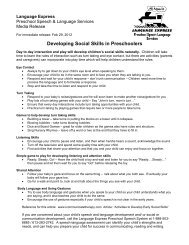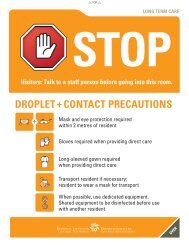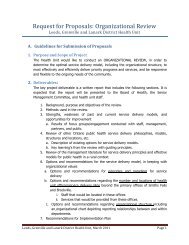TETANUS, DIPHTHERIA (Td)
TETANUS, DIPHTHERIA (Td)
TETANUS, DIPHTHERIA (Td)
You also want an ePaper? Increase the reach of your titles
YUMPU automatically turns print PDFs into web optimized ePapers that Google loves.
FACT SHEET<br />
<strong>TETANUS</strong>, <strong>DIPHTHERIA</strong> (<strong>Td</strong>)<br />
What is Tetanus?<br />
Tetanus is caused by bacteria found in soil, dust, and manure. If these bacteria get into an<br />
open wound or cut, the, poison from the germ can spread to your nerves and then to your<br />
muscles. Muscles may lock in one place or go into spasm (get very tight). This is very<br />
painful. In most cases, the first muscles affected are in the jaw. You may not be able to<br />
swallow or open your mouth. This is why Tetanus is called lockjaw. If the poison gets to<br />
the muscles that help you breathe, you can die quickly.<br />
People who survive Tetanus may have long-lasting problems with speech, memory and<br />
thinking. Those who survive can still get Tetanus again. For this reason, they should get<br />
the vaccine to protect them in the future.<br />
What is Diphtheria?<br />
Diphtheria is an illness caused by bacteria that infect the nose, throat and skin. It causes<br />
serious problems with breathing. It can also cause heart failure and nerve damage that<br />
will affect you for the rest of your life.<br />
Diphtheria is spread by close, direct contact between people. Sneezes or coughs from a<br />
person with diphtheria can infect someone who does not have the disease<br />
Of every 10 people who get Diphtheria, 1 will die from it. Babies who get it are even<br />
more likely to die. There is no good treatment for diphtheria. People who survive<br />
Diphtheria can still get it again. For this reason, they should get the vaccine to protect<br />
them in the future.<br />
Tetanus, Diphtheria (<strong>Td</strong>) Vaccine<br />
The <strong>Td</strong> vaccine is indicated for anyone 7 years of age and older. Most people are<br />
vaccinated against tetanus and diphtheria in early childhood. Provincial law requires<br />
vaccination against Tetanus and Diphtheria for all children attending school in Ontario.<br />
Adults should get <strong>Td</strong> vaccine boosters every 10 years for continued protection, and<br />
ensure immunizations are up to date before travel.<br />
DCS-12-05-VPD-045
Who should NOT get the <strong>Td</strong> vaccine?<br />
‣ Anyone with an allergy to any component of this vaccine including aluminium<br />
phosphate, formaldehyde, or thimerosal<br />
‣ Anyone who has had a severe reaction to this vaccine in the past<br />
‣ Anyone with a fever over 38.5° C (101° F)<br />
Are there any side effects of the vaccine?<br />
Although side effects are rare, the most common side effects of the vaccine are:<br />
‣ Redness, soreness, and swelling at the injection site<br />
‣ Other reactions may include fever, headache, nausea, dizziness, fatigue, joint<br />
pain, and rashes and should subside in 1 to 2 days<br />
‣ Allergic reactions like hives, wheezing, swelling of the face and mouth are<br />
extremely rare, however if these symptoms occur, seek medical attention<br />
immediately and let the Health Unit know about it<br />
It is routine for you to sit and wait in the reception area for 15 minutes after<br />
receiving this vaccine. Please advise the receptionist immediately if you start to feel<br />
ill.<br />
DCS-12-05-VPD-045


